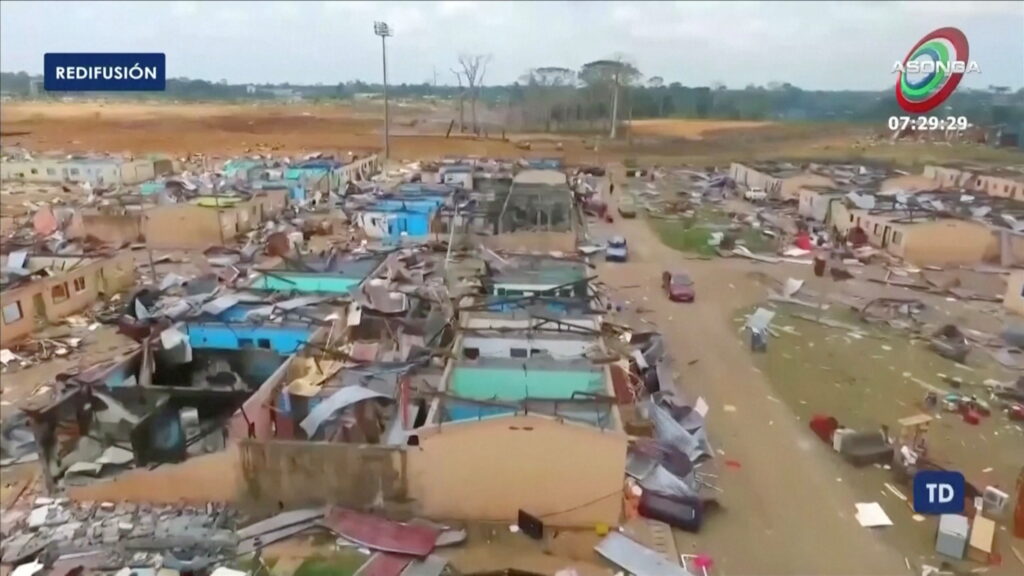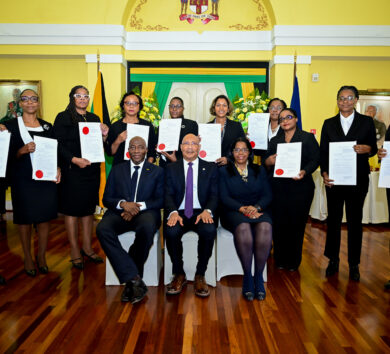

(Reuters)
Callers seeking the parents of lost children have been regularly dialling in to radio and television programmes since a series of explosions levelled much of Equatorial Guinea’s largest city and sent thousands fleeing for the countryside.
Three days on, residents of Bata are still coming to grips with the full scale of a tragedy that has killed at least 105 people and injured more than 600 others.
Drone footage aired on state television showed block after block of public housing in the coastal city either completely destroyed or close to it, the remnants of their roofs and walls strewn across the neighbourhood’s dirt roads.

“There are many children without parents,” said a teacher in Bata, who asked not to be named for fear of reprisals from the authorities in the tightly-controlled central African country. “In the long (term) what do we do with those children?”
The reclusive government blamed the explosions on fires set by farmers living near the military base and the negligent handling of dynamite stocks by the military unit guarding them.
It has decreed three days of national mourning from Wednesday, declared Bata a catastrophe zone, unblocked 10 billion ($18.19 million) CFA francs for the response and appealed for international aid.
Firefighters continued to comb the rubble on Wednesday (March 10) for bodies as onlookers wept, state television showed. The authorities appealed for donations of blood and basic goods.

A five-year old girl was pulled on Wednesday from the rubble of a house in the military camp where the blast occurred, Equato-Guinean media AhoraEG said.
Officials have been forced to turn to refrigerated containers to store bodies, said the teacher and Alfredo Okenve, a human rights activist who lives in exile in Europe.
Okenve said his information indicated the number of deaths was between 150 and 200, significantly higher than the government’s official toll of 105.
Virgilio Seriche, an official at the information ministry, denied that bodies were being stored in containers and said authorities were providing up-to-date information about the number of confirmed deaths.
“The reliable data is what the government is publishing about this incident, not what comes from other sources,” he told Reuters.
Widespread trauma

Bata residents are traumatised from the explosions, which lasted for hours on Sunday, and fearful of additional blasts.
The first explosion “was so big that all of us and the people around us were shouting: ‘This is a bomb, this is a bomb!'” said the teacher.
“People were crying, shouting, running, trying to stay somewhere, but it was panic. We started to see police cars and firemen and people bleeding. It was awful.”
The health ministry said in a tweet that it was deploying psychiatrists and psychologists.
The United Nations said on Wednesday that the World Health Organization (WHO) and children’s agency UNICEF had mobilised teams to control infection and provide logistical support. Spain has sent a first batch of emergency aid.
The former Spanish colony has been run by President Teodoro Obiang Nguema, Africa’s longest-serving leader, since 1979.
It is the Central African country’s worst tragedy in recent memory, and while the government, charitable organisations and private citizens have kept everyone fed and sheltered for now, most of Equatorial Guinea’s 1.4 million people live in poverty.
The country is also suffering a double economic shock from the coronavirus pandemic and a drop in the price of crude oil, which provides about three-fourths of state revenue.

State media has provided wall-to-wall coverage of the disaster, including the appeals over the lost children, a rarity in a country that human rights activists consider one of Africa’s most repressive and where bad news is often suppressed.
Okenve said the scale of the tragedy had left the government with no choice.
“If there is information coming out, it is because it is impossible to control,” he said.







Comments